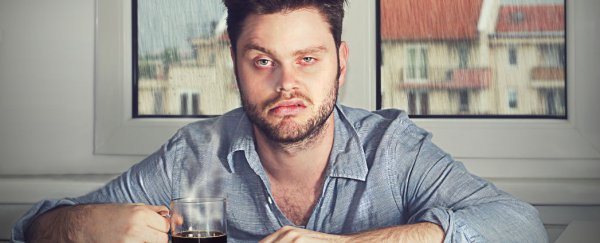For those of us who have woken up in the middle of the night to scribble down an idea, only to realise that it was completely crazy and unrealistic when you read it back to yourself the next morning, the fact that the human brain can get pretty wacky when it's tired is nothing new.
But this wackiness is actually key to how the brain handles brainstorming and riddle-solving - tasks that require you to, yep, "think outside the box", and come up with strange and less obviously feasible solutions to a problem.
Over at Smithsonian Magazine, Marissa Fessenden quotes a Harvard Business Review podcast by American author and screenwriter Ron Friedman, where he explains the basic theory behind this:
"[I]t's partly because, in order to be creative, sometimes you need to consider some ideas that don't necessarily feel like they're on track with what you're trying to achieve. And so having all these ideas come into your mind because you're not quite as good at putting them off when you're tired can actually make you more creative."
And there's actually some pretty fascinating science to back this up. In 2011, a study led by psychologist Marieke Wieth at Albion University in the US set out to investigate the effects of tiredness on a person's ability to perform certain mental tasks. They gathered together 428 university student volunteers and first tested them to see if they were morning people or night owls. They found that 195 participants were evening-type night owls, 28 were morning types, and 205 were neutral.
Next, they got the volunteers to solve several creative problem-solving tasks and more straightforward analytical problems at both their optimal and non-optimal times. Morning sessions were between 8:30am and 9:30am and then there were late afternoon sessions between 4pm and 5:30pm. The volunteers were tested in groups, and were given four minutes to solve each question.
The results showed that the students performed just as well, regardless of the time of day, on the analytical problems, but when it came to the more creative task, the students actually performed better when they were sleepy. This meant in the morning for night owls, and at night for the morning people.
The team discusses the findings in the journal Thinking & Reasoning:
"Given the presumed differences in the cognitive processes involved in solving these two types of problems, it was expected that the reduced inhibitory control associated with non-optimal times of the day would differentially impact performance on the two types of problems.
In accordance with this expectation, results showed consistently greater insight problem solving performance during non-optimal times of day compared to optimal times of day but no consistent time of day effects on analytic problem solving. The findings indicate that tasks involving creativity might benefit from a non-optimal time of day."
The team ended up suggesting that if you're a student, you should try and schedule your more creative classes, such as art and creative writing, at a time when you're not at your best. Night owls, this means sucking it up and doing your creative classes bright and early at 9am.
And while you're at it, try to refrain from drowning your vampire tendencies in coffee, because that will ruin the effects, says Marissa Fessenden at Smithsonian Magazine:
"This effect makes tired people better at solving problems that require insight. That's also why grabbing a cup of coffee isn't always the best way to seek eureka moments. The focus caffeine lends can get in the way of those stray thoughts. Maybe that's also why messy desks often go hand-in-hand with a creative mind - the clutter could be stimulating."
So no coffee, messy desk, sleepy as hell = creative success. Science, you cruel mistress, you.
Source: Smithsonian Magazine
